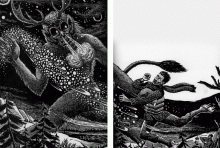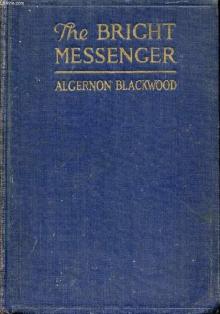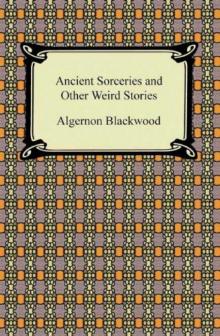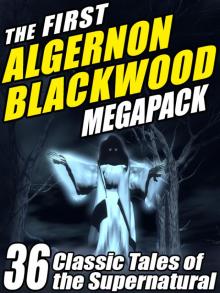- Home
- Algernon Blackwood
John Silence, Physician Extraordinary Page 2
John Silence, Physician Extraordinary Read online
Page 2
"Ah!"
"You see, there's so little I can tell you," she went on, with increasing speed and countless gestures. "I mean it's only very small things he does and says that are queer. What frightens me is that he assumes there is some one else in the house all the time—some one I never see. He does not actually say so, but on the stairs I've seen him standing aside to let some one pass; I've seen him open a door to let some one in or out; and often in our bedrooms he puts chairs about as though for some one else to sit in. Oh—oh yes, and once or twice," she cried—"once or twice—"
She paused, and looked about her with a startled air.
"Yes?"
"Once or twice," she resumed hurriedly, as though she heard a sound that alarmed her, "I've heard him running—coming in and out of the rooms breathless as if something were after him—"
The door opened while she was still speaking, cutting her words off in the middle, and a man came into the room. He was dark and clean-shaven, sallow rather, with the eyes of imagination, and dark hair growing scantily about the temples. He was dressed in a shabby tweed suit, and wore an untidy flannel collar at the neck. The dominant expression of his face was startled—hunted; an expression that might any moment leap into the dreadful stare of terror and announce a total loss of self-control.
The moment he saw his visitor a smile spread over his worn features, and he advanced to shake hands.
"I hoped you would come; Mrs. Sivendson said you might be able to find time," he said simply. His voice was thin and needy. "I am very glad to see you, Dr. Silence. It is 'Doctor,' is it not?"
"Well, I am entitled to the description," laughed the other, "but I rarely get it. You know, I do not practise as a regular thing; that is, I only take cases that specially interest me, or—"
He did not finish the sentence, for the men exchanged a glance of sympathy that rendered it unnecessary.
"I have heard of your great kindness."
"It's my hobby," said the other quickly, "and my privilege."
"I trust you will still think so when you have heard what I have to tell you," continued the author, a little wearily. He led the way across the hall into the little smoking-room where they could talk freely and undisturbed.
In the smoking-room, the door shut and privacy about them, Fender's attitude changed somewhat, and his manner became very grave. The doctor sat opposite, where he could watch his face. Already, he saw, it looked more haggard. Evidently it cost him much to refer to his trouble at all.
"What I have is, in my belief, a profound spiritual affliction," he began quite bluntly, looking straight into the other's eyes.
"I saw that at once," Dr. Silence said.
"Yes, you saw that, of course; my atmosphere must convey that much to any one with psychic perceptions. Besides which, I feel sure from all I've heard, that you are really a soul-doctor, are you not, more than a healer merely of the body?"
"You think of me too highly," returned the other; "though I prefer cases, as you know, in which the spirit is disturbed first, the body afterwards."
"I understand, yes. Well, I have experienced a curious disturbance in—not in my physical region primarily. I mean my nerves are all right, and my body is all right. I have no delusions exactly, but my spirit is tortured by a calamitous fear which first came upon me in a strange manner."
John Silence leaned forward a moment and took the speaker's hand and held it in his own for a few brief seconds, closing his eyes as he did so. He was not feeling his pulse, or doing any of the things that doctors ordinarily do; he was merely absorbing into himself the main note of the man's mental condition, so as to get completely his own point of view, and thus be able to treat his case with true sympathy. A very close observer might perhaps have noticed that a slight tremor ran through his frame after he had held the hand for a few seconds.
"Tell me quite frankly, Mr. Pender," he said soothingly, releasing the hand, and with deep attention in his manner, "tell me all the steps that led to the beginning of this invasion. I mean tell me what the particular drug was, and why you took it, and how it affected you—"
"Then you know it began with a drug!" cried the author, with undisguised astonishment.
"I only know from what I observe in you, and in its effect upon myself. You are in a surprising psychical condition. Certain portions of your atmosphere are vibrating at a far greater rate than others. This is the effect of a drug, but of no ordinary drug. Allow me to finish, please. If the higher rate of vibration spreads all over, you will become, of course, permanently cognisant of a much larger world than the one you know normally. If, on the other hand, the rapid portion sinks back to the usual rate, you will lose these occasional increased perceptions you now have."
"You amaze me!" exclaimed the author; "for your words exactly describe what I have been feeling—"
"I mention this only in passing, and to give you confidence before you approach the account of your real affliction," continued the doctor. "All perception, as you know, is the result of vibrations; and clairvoyance simply means becoming sensitive to an increased scale of vibrations. The awakening of the inner senses we hear so much about means no more than that. Your partial clairvoyance is easily explained. The only thing that puzzles me is how you managed to procure the drug, for it is not easy to get in pure form, and no adulterated tincture could have given you the terrific impetus I see you have acquired. But, please proceed now and tell me your story in your own way."
"This Cannabis indica," the author went on, "came into my possession last autumn while my wife was away. I need not explain how I got it, for that has no importance; but it was the genuine fluid extract, and I could not resist the temptation to make an experiment. One of its effects, as you know, is to induce torrential laughter—"
"Yes: sometimes."
"—I am a writer of humorous tales, and I wished to increase my own sense of laughter—to see the ludicrous from an abnormal point of view. I wished to study it a bit, if possible, and—"
"Tell me!"
"I took an experimental dose. I starved for six hours to hasten the effect, locked myself into this room, and gave orders not to be disturbed. Then I swallowed the stuff and waited."
"And the effect?"
"I waited one hour, two, three, four, five hours. Nothing happened. No laughter came, but only a great weariness instead. Nothing in the room or in my thoughts came within a hundred miles of a humorous aspect."
"Always a most uncertain drug," interrupted the doctor. "We make very small use of it on that account."
"At two o'clock in the morning I felt so hungry and tired that I decided to give up the experiment and wait no longer. I drank some milk and went upstairs to bed. I felt flat and disappointed. I fell asleep at once and must have slept for about an hour, when I awoke suddenly with a great noise in my ears. It was the noise of my own laughter! I was simply shaking with merriment. At first I was bewildered and thought I had been laughing in dreams, but a moment later I remembered the drug, and was delighted to think that after all I had got an effect. It had been working all along, only I had miscalculated the time. The only unpleasant thing then was an odd feeling that I had not waked naturally, but had been wakened by some one else—deliberately. This came to me as a certainty in the middle of my noisy laughter and distressed me."
"Any impression who it could have been?" asked the doctor, now listening with close attention to every word, very much on the alert.
Pender hesitated and tried to smile. He brushed his hair from his forehead with a nervous gesture.
"You must tell me all your impressions, even your fancies; they are quite as important as your certainties."
"I had a vague idea that it was some one connected with my forgotten dream, some one who had been at me in my sleep, some one of great strength and great ability—of great force—quite an unusual personality—and, I was certain, too—a woman."
"A good woman?" asked John Silence quietly.
Pender started a little
at the question and his sallow face flushed; it seemed to surprise him. But he shook his head quickly with an indefinable look of horror.
"Evil," he answered briefly, "appallingly evil, and yet mingled with the sheer wickedness of it was also a certain perverseness—the perversity of the unbalanced mind."
He hesitated a moment and looked up sharply at his interlocutor. A shade of suspicion showed itself in his eyes.
"No," laughed the doctor, "you need not fear that I'm merely humouring you, or think you mad. Far from it. Your story interests me exceedingly and you furnish me unconsciously with a number of clues as you tell it. You see, I possess some knowledge of my own as to these psychic byways."
"I was shaking with such violent laughter," continued the narrator, reassured in a moment, "though with no clear idea what was amusing me, that I had the greatest difficulty in getting up for the matches, and was afraid I should frighten the servants overhead with my explosions. When the gas was lit I found the room empty, of course, and the door locked as usual. Then I half dressed and went out on to the landing, my hilarity better under control, and proceeded to go downstairs. I wished to record my sensations. I stuffed a handkerchief into my mouth so as not to scream aloud and communicate my hysterics to the entire household."
"And the presence of this—this—?"
"It was hanging about me all the time," said Pender, "but for the moment it seemed to have withdrawn. Probably, too, my laughter killed all other emotions."
"And how long did you take getting downstairs?"
"I was just coming to that. I see you know all my 'symptoms' in advance, as it were; for, of course, I thought I should never get to the bottom. Each step seemed to take five minutes, and crossing the narrow hall at the foot of the stairs—well, I could have sworn it was half an hour's journey had not my watch certified that it was a few seconds. Yet I walked fast and tried to push on. It was no good. I walked apparently without advancing, and at that rate it would have taken me a week to get down Putney Hill."
"An experimental dose radically alters the scale of time and space sometimes—"
"But, when at last I got into my study and lit the gas, the change came horridly, and sudden as a flash of lightning. It was like a douche of icy water, and in the middle of this storm of laughter—"
"Yes; what?" asked the doctor, leaning forward and peering into his eyes.
"—I was overwhelmed with terror," said Pender, lowering his reedy voice at the mere recollection of it.
He paused a moment and mopped his forehead. The scared, hunted look in his eyes now dominated the whole face. Yet, all the time, the corners of his mouth hinted of possible laughter as though the recollection of that merriment still amused him. The combination of fear and laughter in his face was very curious, and lent great conviction to his story; it also lent a bizarre expression of horror to his gestures.
"Terror, was it?" repeated the doctor soothingly.
"Yes, terror; for, though the Thing that woke me seemed to have gone, the memory of it still frightened me, and I collapsed into a chair. Then I locked the door and tried to reason with myself, but the drug made my movements so prolonged that it took me five minutes to reach the door, and another five to get back to the chair again. The laughter, too, kept bubbling up inside me—great wholesome laughter that shook me like gusts of wind—so that even my terror almost made me laugh. Oh, but I may tell you, Dr. Silence, it was altogether vile, that mixture of fear and laughter, altogether vile!
"Then, all at once, the things in the room again presented their funny side to me and set me off laughing more furiously than ever. The bookcase was ludicrous, the arm-chair a perfect clown, the way the clock looked at me on the mantelpiece too comic for words; the arrangement of papers and inkstand on the desk tickled me till I roared and shook and held my sides and the tears streamed down my cheeks. And that footstool! Oh, that absurd footstool!"
He lay back in his chair, laughing to himself and holding up his hands at the thought of it, and at the sight of him Dr. Silence laughed, too.
"Go on, please," he said, "I quite understand. I know something myself of the hashish laughter."
The author pulled himself together and resumed, his face growing quickly grave again.
"So, you see, side by side with this extravagant, apparently causeless merriment, there was also an extravagant, apparently causeless terror. The drug produced the laughter, I knew; but what brought in the terror I could not imagine. Everywhere behind the fun lay the fear. It was terror masked by cap and bells; and I became the playground for two opposing emotions, armed and fighting to the death. Gradually, then, the impression grew in me that this fear was caused by the invasion—so you called it just now—of the 'person' who had wakened me: she was utterly evil; inimical to my soul, or at least to all in me that wished for good. There I stood, sweating and trembling, laughing at everything in the room, yet all the while with this white terror mastering my heart. And this creature was putting—putting her—"
He hesitated again, using his handkerchief freely.
"Putting what?"
"—putting ideas into my mind," he went on glancing nervously about the room. "Actually tapping my thought-stream so as to switch off the usual current and inject her own. How mad that sounds! I know it, but it's true. It's the only way I can express it. Moreover, while the operation terrified me, the skill with which it was accomplished filled me afresh with laughter at the clumsiness of men by comparison. Our ignorant, bungling methods of teaching the minds of others, of inculcating ideas, and so on, overwhelmed me with laughter when I understood this superior and diabolical method. Yet my laughter seemed hollow and ghastly, and ideas of evil and tragedy trod close upon the heels of the comic. Oh, doctor, I tell you again, it was unnerving!"
John Silence sat with his head thrust forward to catch every word of the story which the other continued to pour out in nervous, jerky sentences and lowered voice.
"You saw nothing—no one—all this time?" he asked.
"Not with my eyes. There was no visual hallucination. But in my mind there began to grow the vivid picture of a woman—large, dark-skinned, with white teeth and masculine features, and one eye—the left—so drooping as to appear almost closed. Oh, such a face—!"
"A face you would recognise again?"
Pender laughed dreadfully.
"I wish I could forget it," he whispered, "I only wish I could forget it!" Then he sat forward in his chair suddenly, and grasped the doctor's hand with an emotional gesture.
"I must tell you how grateful I am for your patience and sympathy," he cried, with a tremor in his voice, "and—that you do not think me mad. I have told no one else a quarter of all this, and the mere freedom of speech—the relief of sharing my affliction with another—has helped me already more than I can possibly say."
Dr. Silence pressed his hand and looked steadily into the frightened eyes. His voice was very gentle when he replied.
"Your case, you know, is very singular, but of absorbing interest to me," he said, "for it threatens, not your physical existence but the temple of your psychical existence—the inner life. Your mind would not be permanently affected here and now, in this world; but in the existence after the body is left behind, you might wake up with your spirit so twisted, so distorted, so befouled, that you would be spiritually insane—a far more radical condition than merely being insane here."
There came a strange hush over the room, and between the two men sitting there facing one another.
"Do you really mean—Good Lord!" stammered the author as soon as he could find his tongue.
"What I mean in detail will keep till a little later, and I need only say now that I should not have spoken in this way unless I were quite positive of being able to help you. Oh, there's no doubt as to that, believe me. In the first place, I am very familiar with the workings of this extraordinary drug, this drug which has had the chance effect of opening you up to the forces of another region; and, in the second, I ha
ve a firm belief in the reality of supersensuous occurrences as well as considerable knowledge of psychic processes acquired by long and painful experiment. The rest is, or should be, merely sympathetic treatment and practical application. The hashish has partially opened another world to you by increasing your rate of psychical vibration, and thus rendering you abnormally sensitive. Ancient forces attached to this house have attacked you. For the moment I am only puzzled as to their precise nature; for were they of an ordinary character, I should myself be psychic enough to feel them. Yet I am conscious of feeling nothing as yet. But now, please continue, Mr. Pender, and tell me the rest of your wonderful story; and when you have finished, I will talk about the means of cure."
Pender shifted his chair a little closer to the friendly doctor and then went on in the same nervous voice with his narrative.
"After making some notes of my impressions I finally got upstairs again to bed. It was four o'clock in the morning. I laughed all the way up—at the grotesque banisters, the droll physiognomy of the staircase window, the burlesque grouping of the furniture, and the memory of that outrageous footstool in the room below; but nothing more happened to alarm or disturb me, and I woke late in the morning after a dreamless sleep, none the worse for my experiment except for a slight headache and a coldness of the extremities due to lowered circulation."
"Fear gone, too?" asked the doctor.
"I seemed to have forgotten it, or at least ascribed it to mere nervousness. Its reality had gone, anyhow for the time, and all that day I wrote and wrote and wrote. My sense of laughter seemed wonderfully quickened and my characters acted without effort out of the heart of true humour. I was exceedingly pleased with this result of my experiment. But when the stenographer had taken her departure and I came to read over the pages she had typed out, I recalled her sudden glances of surprise and the odd way she had looked up at me while I was dictating. I was amazed at what I read and could hardly believe I had uttered it."

 Day and Night Stories
Day and Night Stories Four Weird Tales
Four Weird Tales The Wendigo
The Wendigo Three More John Silence Stories
Three More John Silence Stories The Garden of Survival
The Garden of Survival The Extra Day
The Extra Day The Bright Messenger
The Bright Messenger Collected Works of Algernon Blackwood
Collected Works of Algernon Blackwood The Empty House
The Empty House Three John Silence Stories
Three John Silence Stories 13 Tales of Terror
13 Tales of Terror A Prisoner in Fairyland
A Prisoner in Fairyland Ancient Sorceries And Other Weird Stories
Ancient Sorceries And Other Weird Stories The Algernon Blackwood Collection
The Algernon Blackwood Collection The First Algernon Blackwood Megapack: 36 Classic Tales of the Supernatural
The First Algernon Blackwood Megapack: 36 Classic Tales of the Supernatural John Silence, Physician Extraordinary
John Silence, Physician Extraordinary The Second Algernon Blackwood Megapack: 28 Classic Tales of the Supernatural
The Second Algernon Blackwood Megapack: 28 Classic Tales of the Supernatural The First Algernon Blackwood Megapack
The First Algernon Blackwood Megapack The Second Algernon Blackwood Megapack
The Second Algernon Blackwood Megapack